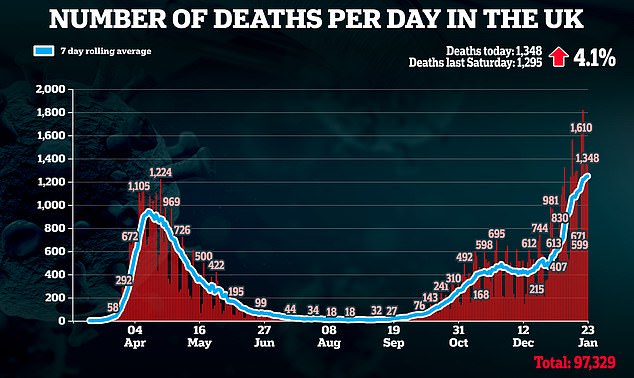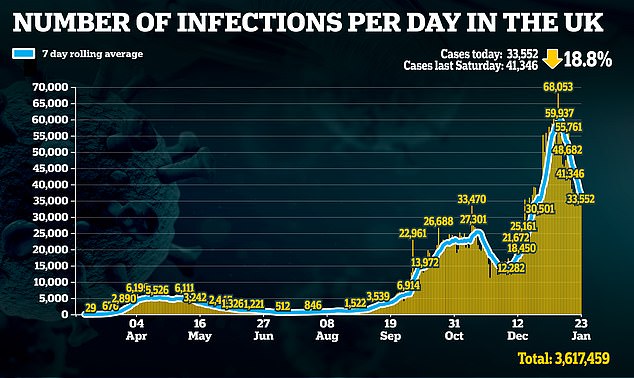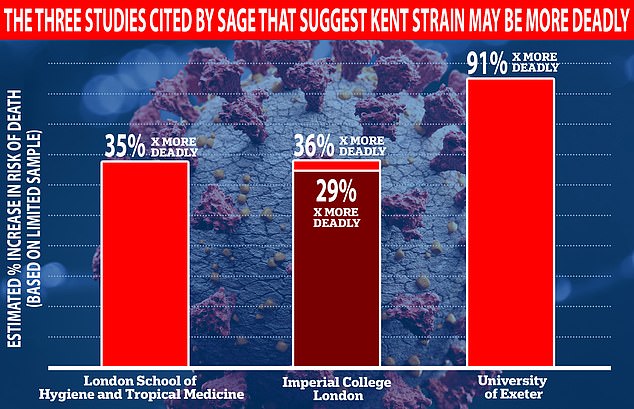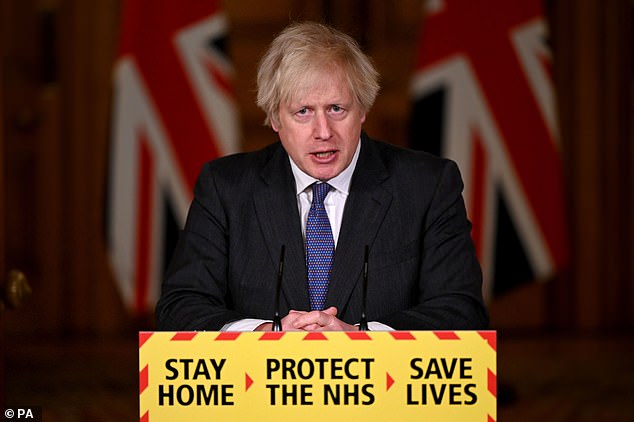Britons who have received first Covid jab must stay at home for THREE WEEKS so immunity 'kicks in'
People who have received their first Covid-19 jab must stay at home for three weeks after their injection because it can take that long for immunity to ‘kick in’, Professor Jonathan Van-Tam warned last night.
He said that while getting vaccinated was ‘something to celebrate’, recipients of the jab needed to ‘stay patient’.
The caution of England’s Deputy Chief Medical Officer comes amid concern from Ministers that vaccinated people might start mixing with others or relax their social distancing too soon.
That could be deadly for elderly recipients of the vaccine, who make up the bulk of those who have had it so far, and risk spreading the virus more widely among the population at large.
Prof Van-Tam said: ‘Regardless of whether someone has had their vaccination or not, it is vital everyone follows the national restrictions and public health advice, as protection takes up to three weeks to kick in and we don’t yet know the impact of vaccines on transmission.’

Deputy Chief Medical Officer for England Jonathan Van-Tam during a media briefing on coronavirus (COVID-19) in Downing Street, London


The warning from Prof Van Tam came as Britain’s daily Covid case total plunged by 18 per cent in a week after experts played down the Government’s ‘scaremongering’ claims that a UK variant of coronavirus is more deadly than the original strain.
A further 33,552 people tested positive for coronavirus on Saturday – a nearly 10,000 drop on the 41,346 recorded last Saturday. It brings the total number of cases in the UK since the start of the pandemic to 3,617,459.
Official figures also revealed 1,348 more people have died within 24 hours of testing positive for the virus – a rise of 4.1 per cent on last Saturday’s 1,295.
But, in a positive sign Britain’s third wave of Covid fatalities could be slowing, last Saturday brought a 25 per cent week-on-week rise in daily cases, significantly higher than the increase seen today.
Boris Johnson yesterday revealed that the Kent coronavirus strain – responsible for the soaring Covid cases recorded in the last month – could be 30 per cent more deadly than older versions of the virus.
However the PM has been accused of ‘scaremongering’ after failing to present any evidence to back up the terrifying development.
And the Scientific Advisory Group for Emergencies (Sage) – the body of scientists which has advised the Government throughout the pandemic – are only 50 per cent sure the new variant could be more fatal.
Professor Robert Dingwall, who sits on the New and Emerging Respiratory Virus Threats Advisory Group (Nervtag) – the subcommittee of Sage which discussed the deadliness of the new strain on Thursday – said the claim that the variant is 30 per cent more lethal is on a ‘very fragile’ base of evidence and accused the Government of ‘exploiting public fear’ over the virus.
Chief Scientific advisor Sir Patrick Vallance said during the press conference that evidence the strain is indeed more deadly is still ‘weak’.
Public Health England medical director Dr Yvonne Doyle today revealed it is not ‘absolutely clear’ if a mutation of the virus first found in Kent is more dangerous.
Graham Medley, professor of infectious disease modelling at the London School of Hygiene and Tropical Medicine, said it is an ‘open question’ but not a ‘game changer’ in terms of dealing with the pandemic.
And Dr Mike Tildesley, a member of Sage subgroup the Scientific Pandemic Influenza Group on Modelling, said it was still too early to be drawing ‘strong conclusions’ about the suggested increased mortality rate.
PHE’s Dr Doyle said it is still not ‘absolutely clear’ the new variant coronavirus which emerged in the UK is more deadly than the original strain. She said more work was needed to determine whether it was true.
She told the Today programme: ‘There are several investigations going on at the moment. It is not absolutely clear that that will be the case. It is too early to say.
‘There is some evidence, but it is very early evidence. It is small numbers of cases and it is far too early to say this will actually happen.’
Figures released today showed there were a further 1,079 cases of coronavirus in Wales and another 27 deaths.
Meanwhile, a further 76 people have died from coronavirus in Scotland, while 1,307 more positive cases have been confirmed.
There have been 12 more deaths due to Covid-19 in Northern Ireland, while a further 670 positive cases of the virus were also confirmed there on Saturday.
Separate figures published by the UK’s statistics agencies for deaths where Covid-19 has been mentioned on the death certificate, together with additional data on deaths that have occurred in recent days, show there have now been 113,000 deaths involving Covid-19 in the UK.
The Government also said that, as of 9am on Friday, there had been a further 33,552 lab-confirmed cases of coronavirus in the UK.

The Sage paper cited three studies of the Kent strain: A London School of Hygiene and Tropical Medicine study (left) based on 2,583 deaths that said the hazard of death within 28 days of test for the mutant strain compared with non-mutant strains was 35% times higher An Imperial College London study (centre) of the Case Fatality Rate of the new mutant strain that found the risk of death was 36% times higher A University of Exeter study (right) that suggested the risk of death could be 91% higher. Both the Exeter and the Imperial studies were based on just 8% of deaths during the study period

Boris Johnson (pictured) yesterday revealed that the Kent coronavirus strain – called B.1.1.7 – could be 30 per cent more deadly than older versions of the virus
Government data up to January 22 shows of the 6,329,968 jabs given in the UK so far, 5,861,351 were first doses – a rise of 478,248 on the previous day’s figures.
Some 468,617 were second doses, an increase of 1,821 on figures released the previous day.
The seven-day rolling average of first doses given in the UK is now 328,882.
Based on the latest figures, an average of 397,333 first doses of vaccine would be needed each day in order to meet the Government’s target of 15 million first doses by February 15.
It comes after Sage’s warning revealing scientists are only 50 per cent sure the variant could be more fatal was handed to ministers just hours before the official address to the public from Downing Street last night.
Ministers were only informed about the development yesterday morning after members of Nervtag discussed the issue on Thursday.
The group found there was a ‘realistic possibility’ the variant resulted in an increased risk of death when compared with the original strain.

